Learning with purpose
How Elon’s distinctive model for teaching and learning has led to fulfilling careers and a rise in national distinction
By the time Chris Adamik graduated from Elon University in 2020, he had evolved from a self-proclaimed “wannabe science major” into a “science fanatic” ready to take on a rapidly changing world. He attributes that transformation to his professors in the chemistry department, who were not only intellectually stimulating, but also gifted at translating scientific theory into practice.
There was Professor Kathy Matera, who often used tangible examples in the classroom to illustrate the everyday applications of complex processes, such as detailing the effects Adamik’s snack was having on his body as he ate it. And Professor Joel Karty, who routinely made room for eight or nine students at a four-person table in his office so anyone could ask questions outside of class. And Associate Professor Justin Clar, who designed a lab in a way that made students feel confident they were getting all the right results, only to end the lesson by asking whether anyone realized something in the solution they were working with could have produced an incorrect result.
“It was a four-hour training in how what you think you know is not always the case,” says Adamik, a biochemistry major from Bedford, Massachusetts. “You have to question your work and think critically. The learning curve was exponential.”
Adamik left Elon with a robust foundation in scientific literacy and competency that landed him a job at Moderna, where he was part of a team that manufactured the DNA to develop the mRNA vaccine for COVID-19. He now serves as a senior research associate in Moderna’s Nucleic Acid Technology Group, working on novel modifications to RNA.
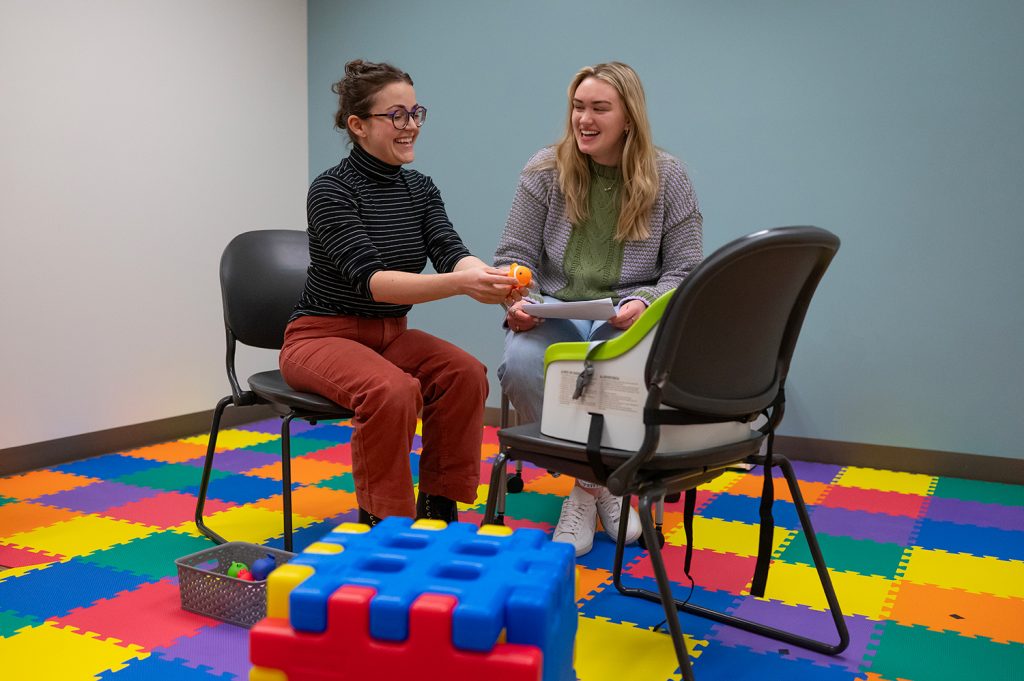
Associate Professor of Psychology Sabrina Thurman, left, explains laboratory procedures to a student in the psychology lab.
Adamik says Elon faculty provided him with access to scientific instruments throughout his four years that seamlessly translated to his first job, putting him ahead of other new employees from universities where they hadn’t had the same hands-on experience.
“I have relied on every bit of teaching from every course that I ever took at Elon in my career today,” Adamik says. “All of my professors just drilled home that if you want to be a global citizen, if you want to be an agent for change, it ultimately comes down to are you going to take all the lessons you’ve learned here and run with it, and I did.”
Adamik’s experience is one example of the transformative impact of an Elon education — where learning happens within a relationship-rich framework that involves mentors and peers helping students connect the dots and encouraging them to immerse themselves in all that piques their curiosity from day one.
This distinctly experiential approach to teaching and learning is why U.S. News & World Report has ranked Elon No. 1 in the nation for undergraduate teaching excellence for three consecutive years.
“The most important message our students can receive is that having an ongoing growth mindset and commitment to learning throughout life leads to a richer and more meaningful existence,” says Elon University President Connie Ledoux Book. “Learning is the most powerful instrument we have. If what you value in your collegiate experience is being able to be challenged and supported through learning new knowledge, then Elon leads in that space. That is our differentiator.”
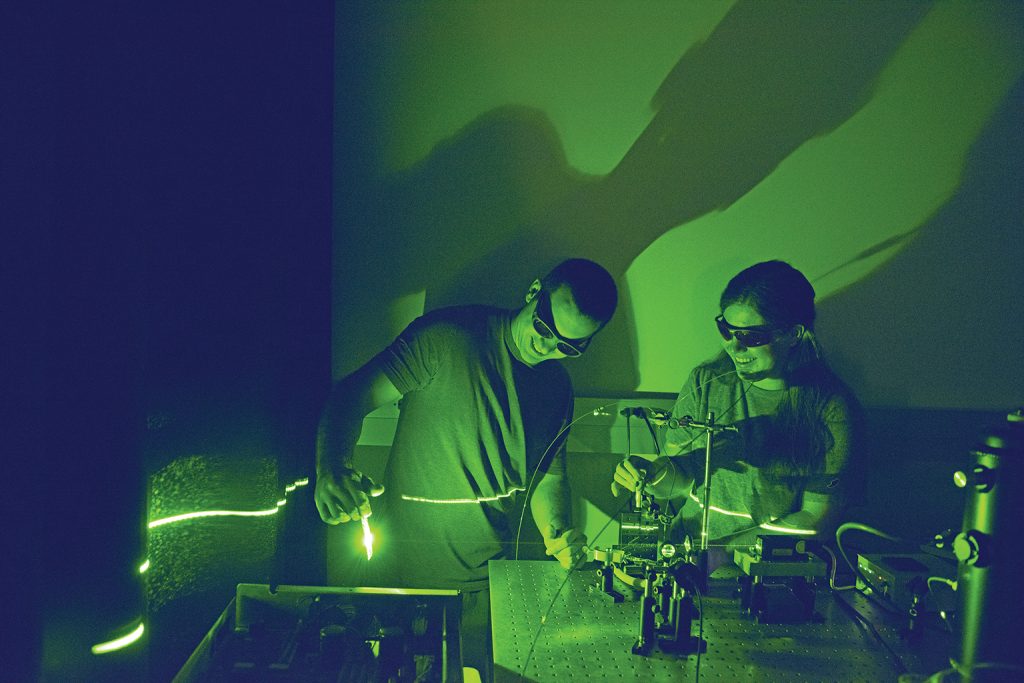
Associate Professor of Chemistry Tony Rizzuto works with a student in a laser lab.
Laying an intentional foundation
This recognition for a commitment to excellence in teaching is the result of decades of intentional and strategic work by scores of innovative faculty and staff. Elon has cultivated an environment that prioritizes what matters most to a student’s experience, including the power of a great teacher. The university has continually invested in programs and curricula that support the whole student in mind, body and spirit.
The groundwork was laid more than a half-century ago. Under President J. Earl Danieley — who, like Book, was a faculty member before leading the institution — Elon implemented a 4-1-4 academic calendar and added study abroad programs in 1969. The creation of a month-long Winter Term between fall and spring semesters allowed students to immerse themselves in an intensive course or global learning experience, a structure that paved the way for a signature approach to engaged learning that endures to this day.
Throughout the 1980s and ’90s, President J. Fred Young expanded Elon’s commitment to experiential education and worked to enhance the university’s academic rigor. During his tenure, Elon added new majors and its first graduate programs, established a Learning Resource Center for tutoring and a more substantial career services office, and strengthened its academic and strategic planning. Under Young’s leadership, the university committed to hiring more full-time faculty and offered more professional development.
The most important message our students can receive is that having an ongoing growth mindset and commitment to learning throughout life leads to a richer and more meaningful existence.
“When we hired people, we let them know that teaching was our focus,” says Gerald Francis, provost emeritus who worked at Elon from 1974 to 2015. “We would not only hire scholars; we were hiring folks who also wanted to be great teachers. And the teaching occurred inside and outside the classroom.”
Elon faculty took a bold step in 1994 with the introduction of a new Core Curriculum — at the time a novel and highly experiential liberal arts and sciences requirement for all students regardless of major — and revamping the academic schedule so classes met for four hours each week instead of three. The new structure allowed faculty more time to incorporate active learning strategies into their courses in addition to lectures, including group work, presentations, discussions, simulations, discovery-based research, case studies and field experiences outside the classroom.
“The expectation was, how are you using the fourth hour? And the fourth hour should be focused on practicums, writing across the curriculum, collaborative learning, different pedagogies, and we supported our faculty through workshops to develop those pedagogies,” Francis says. “Now we expected higher quality out of them. I expected more writing from them. I expected more interactions with students. It also allowed them more time for scholarly work.”
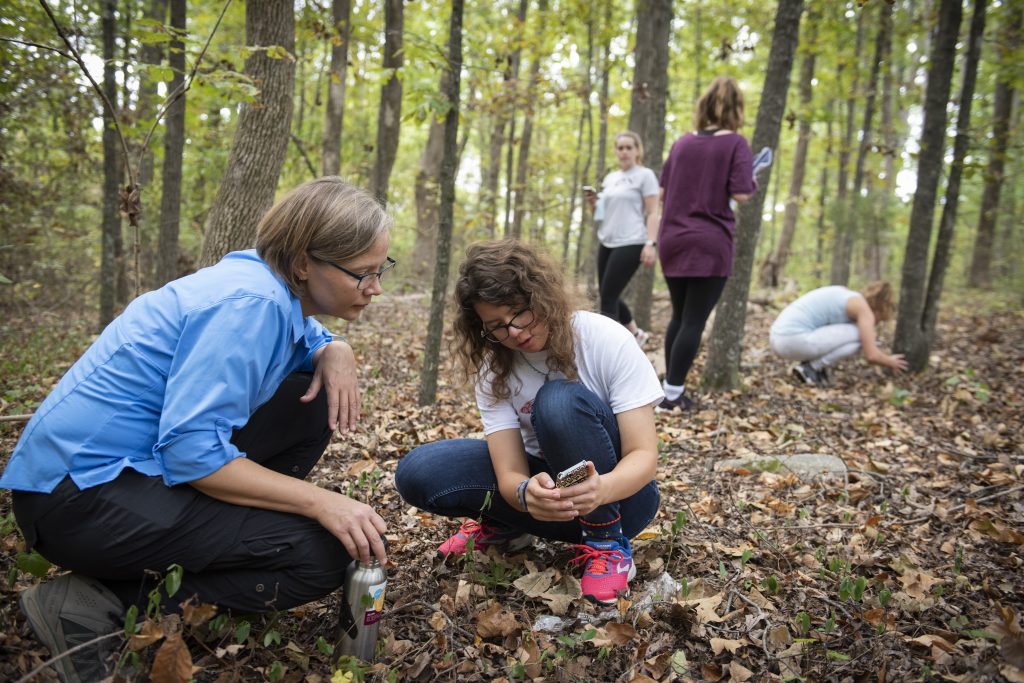
Students in Associate Professor of Biology Jen Hamel’s biodiversity class use the iNaturalist app to document their findings.
In addition to overhauling its academic philosophy, the university introduced the Elon Experiences, co-curricular opportunities that reflected Elon’s long-held values and bolstered student learning and personal development. The original Elon Experiences included study abroad, service, internships and leadership, with undergraduate research later added as a fifth experience. The university also created an experiential learning transcript so students could show prospective employers and graduate programs the full breadth of their Elon education, not just their academic record.
“[President Young] felt we needed programs that engaged students and expressed the university’s values for contemporary times,” says President Emeritus Leo Lambert, who led Elon from 1999 to 2018 and worked to ensure Elon’s distinct philosophy of experiential education permeated every discipline. “The institution’s intentionality about experiential learning is a key aspect of this story. Our faculty are brilliant at helping students see the connections between these experiences and the theory and knowledge they are teaching in the classroom.”
Elon amplified its faculty scholarship efforts throughout the 2000s without losing its focus on relationship-rich teaching and learning. The teacher-scholar-mentor model underscores the ways teaching and scholarship intersect at Elon, including how faculty scholarship enhances classroom learning and undergraduate research opportunities.
“When people ask how Elon does it, I say the kernel of the story is we take the teacher-scholar-mentor model very seriously. It means teaching is not confined to the classroom,” Lambert says. “Some of the best teaching that goes on at Elon happens in undergraduate research, which begins with the relationships that form in the classroom, and that extend well beyond because the faculty values this culture of including students in their scholarship.”
Collaborative community and meaningful relationships remain core values at Elon under Book’s leadership. Even at the height of the COVID-19 pandemic, the university reaffirmed its commitment to engaged learning by operating in person in fall 2020, thanks to strict health and safety protocols and unique course adjustments such as adapting lessons to outdoor classrooms.
“Having been a faculty member, I understood that was going to be a very challenging semester from a teaching perspective and had compassion for that,” Book says. “We gave our faculty a stipend that summer to revisit their classes and allocated additional resources to help them navigate this situation.”
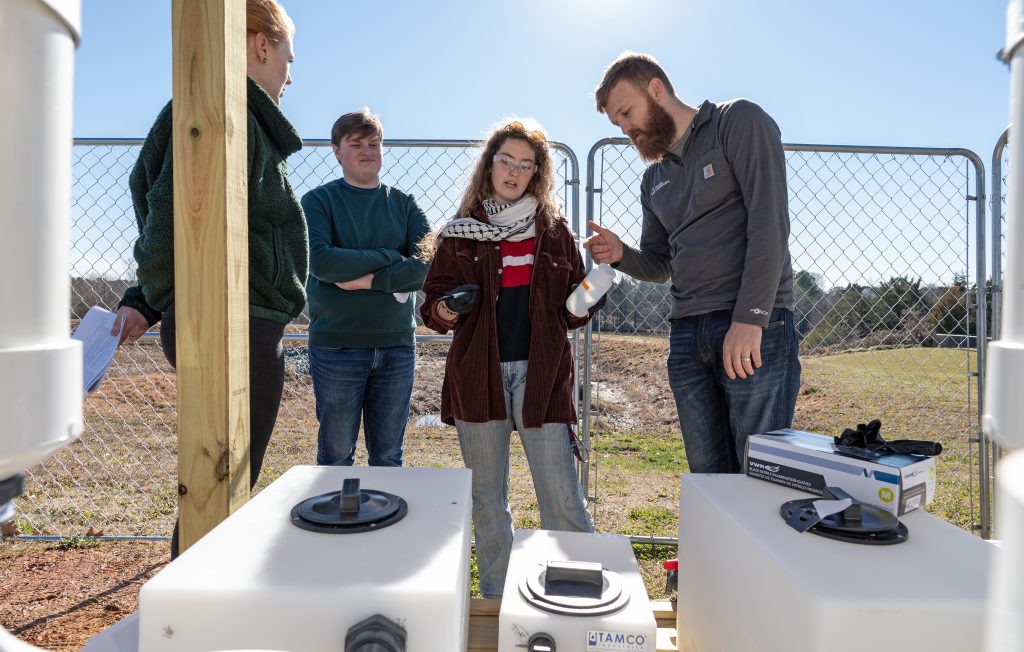
Elon engineering students collaborate with Duke University’s Center for WaSH-AID; Oldcastle Infrastructure, a CRH Company; and Triangle Environmental Health Initiative to test cutting-edge material to reduce water pollution.
Supporting innovative pedagogies
Elon has long been committed to not only recruiting exceptional faculty, but providing them with a dynamic network of resources to help them grow and thrive. These evidence-based initiatives support faculty from before they even set foot on campus through their Elon careers. They provide opportunities for faculty across the university to engage with each other, to explore familiar and innovative pedagogies, and to think critically and reflectively about their teaching practice.
The Center for the Advancement of Teaching and Learning, for example, serves as a catalyst for effective, inclusive teaching and learning at Elon. Whether helping to spark new ideas or strengthen existing practices, CATL supports faculty through one-on-one consultations, classroom observations, mid-semester student focus groups, workshops, working groups, grants, and scholarship of teaching and learning projects.
“I think one of the reasons people look to Elon is because we have made a real, intentional commitment to supporting teaching and learning,” says Associate Provost for Faculty Affairs Deandra Little, who served as director of CATL from 2013 to 2023. “Faculty development through CATL and other spaces is about innovation, in small and large ways.”
Book credits CATL with enhancing her teaching when she was a faculty member at Elon. She still recalls one piece of feedback from Little that changed the dynamic of her class. Rather than immediately answering students’ questions herself, Book started asking other students to weigh in first. Their contributions added rich new layers to the discussion. Book says those kinds of techniques deepened her approach to teaching through her entire career.
I think one of the reasons people look to Elon is because we have made a real, intentional commitment to supporting teaching and learning.
“Elon tends to hire and retain faculty and staff who are really committed to this mission and to further it in their own individual classrooms,” Little says. “The resources we’ve put into place help people thrive in that space, which then leads people to try new things, to innovate, to develop more scholarly approaches to teaching. All of those things foster an ecosystem of effective teaching and learning.”
Associate Provost for Academic Excellence and Operations Paul Miller, whose Elon career has spanned from assistant to full professor and to roles in the provost’s office, says he’s benefited from Elon’s teaching support infrastructure at every level. In his experience, the collaborative nature of the faculty and the spirit of exploration in the classroom create an ethos of lifelong learning that extends to students.
“The skills to become a lifelong learner have to be practiced,” Miller says. “It’s like a muscle. You have to exercise the muscle and be able to really engage in something, be curious, seek depth of understanding and variety of perspective. That’s how we do things, and we instill that development in students, and it carries on beyond their time here.”
The Center for Engaged Learning broadens that ethos beyond Elon’s campus and into the international conversation around teaching and learning. Under the leadership of Executive Director Peter Felten and Director Jessie Moore, CEL not only provides Elon faculty with opportunities to deepen their expertise in engaged learning topics but engages higher education leaders around the world in this work. The center facilitates multi-institutional research seminars; produces publications, podcasts and blogs; and hosts conferences and think tanks.
“CEL tries to identify where the gaps are in the scholarship around engaged learning, and then we create research teams and collaborations to help fill those areas, which will inform practice here and long-term practice around the country and the world,” says Felten, who also serves as Elon’s assistant provost for teaching and learning.
The U.S. News ranking for undergraduate teaching excellence further solidifies Elon’s faculty as national leaders in high-impact learning.
“There are faculty around campus who, for example, were great mentors to undergraduate research and are now widely seen around the country, and in some cases the world, as not only great mentors but scholars of mentoring undergraduate research,” Felten says. “If you want to know about how to mentor undergraduate research, these are the people to talk to. That positions our colleagues and the institution as a leader.”
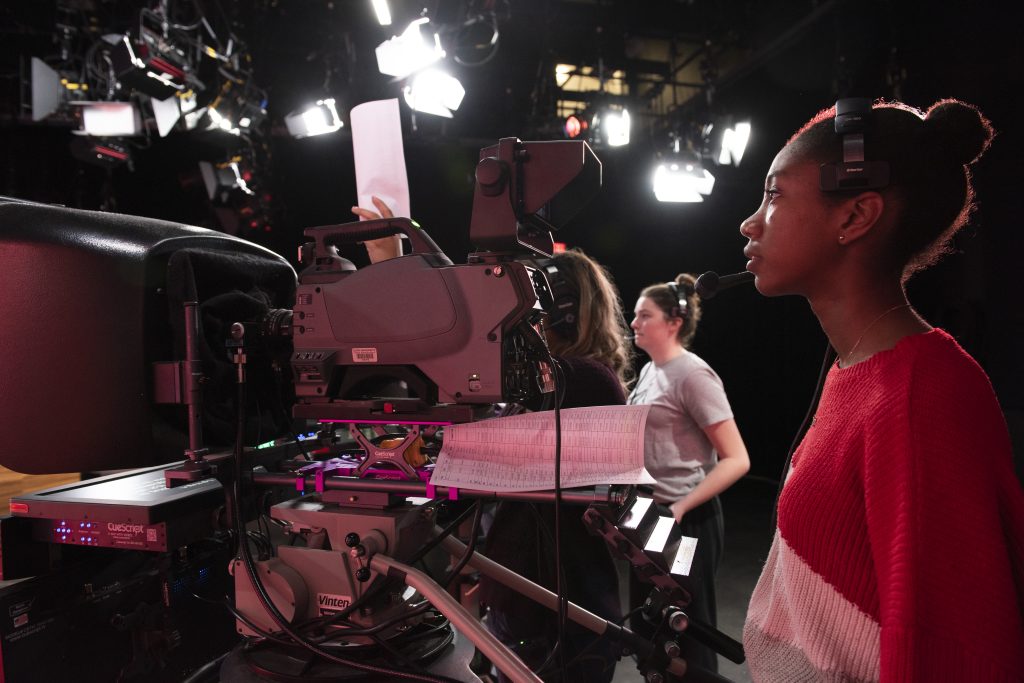
Students put theory to practice as they film a news show in the School of Communications.
Deepening a sense of purpose
Elon will continue to be a pioneer in engaged learning by enhancing the practices that have shaped the institution to this point and building on them through ambitious new goals in the Boldly Elon strategic plan. Highlights include developing a groundbreaking mentoring model that will teach every student to build a network of mentors, including peers, faculty, staff and others beyond the university; advancing a cross-disciplinary STEM program grounded in the liberal arts and experiential learning; and deepening investment in the arts and sciences to ensure Elon graduates are creative, culturally agile, ethically grounded and well-prepared to address questions of societal importance.
Boldly Elon also calls for increasing the number of faculty and staff, as well as advancing compensation, well-being, professional development and faculty scholarship support. “We’re making a commitment to continue to scale and invest in full-time faculty who have a presence on campus, who are advisers, who mentor, who sponsor research and who impact students in one-on-one ways,” Book says.
Part of that investment includes the new Trustee Chair for Excellence in Undergraduate Teaching, a professorship established by Elon’s board of trustees to acknowledge the paramount importance of high-quality teaching to Elon’s mission.
“Part of Elon’s success is due to the strategic decisions over time to empower our teachers to continue to deliver our distinctive learning model,” said former Board Chair Ed Moriarty in announcing the new endowed chair in 2022. As an Elon parent, he has seen firsthand the impact of Elon’s remarkable teaching and learning culture on his own children. “I’m looking forward to hearing more stories about the impact that teaching has in the classroom.”
Part of Elon’s success is due to the strategic decisions over time to empower our teachers to continue to deliver our distinctive learning model.
Elon’s ranking in undergraduate teaching excellence, Miller says, is not just because of the great faculty or great students the institution attracts, but rather “because of the synergy that’s created among all the people on campus.”
Book says Elon’s goal is to help students live not their best life but their truest life, where their sense of purpose lies. The experiences and connections students forge at Elon empower them to discover their full potential. Adamik is among the thousands of students who have paved the road toward their truest life at Elon, laying the foundation for a lifetime of curiosity, integrity and innovation in whatever they do.
“In a lot of science, you need to stand on the shoulders of previous scientists, and I feel as if I’m standing on the shoulders of my Elon professors,” Adamik says. “I’m continuing their legacy and honored to be waving the flag alongside them. And I’m ready for people to stand on my shoulders and continue the movement.”
